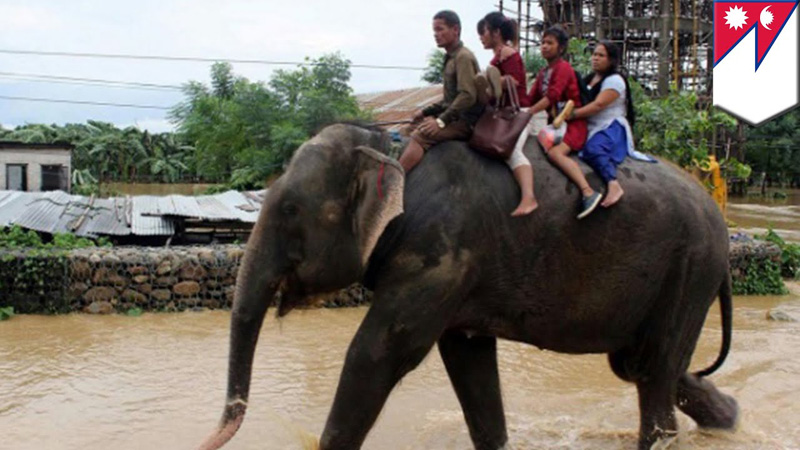Actions have meanings, intended or unintended, and at times some of us are guilty of analyzing and reanalyzing things which might have been said or done in passing. But as the intensity of such action increases, a pattern of some sort emerges. This pattern slowly builds adjoining narratives which tend to have a life of their own, sometimes even independent of the initial intention.
Group stereotypes or other instances of cultural appropriation we encounter in our day to day life are consequences of one such patterned action. This not only dehumanizes the group at the receiving end of, but also generalizes complexities of their lived reality as trivial, measurable and subject of fascination. This is also evident in the video coverage “Elephants to the rescue in Nepal” produced by Al Jazeera on the recent floods in Nepal.
Elephants and flood
The coverage, dated August 16, may be ignored as another attempt at benign journalism where an “intriguing” feature of Global South is carefully picked and marketed for the “commercial”, “waiting to be fascinated” North. But a careful scrutiny shows a familiar pattern of confirmation bias, where an event is picked and generalized, without much research, only to confirm preconceived biases.
The coverage starts with the use of elephants in Chitwan district, one of the 75 districts of Nepal and a famous tourist destination, to help the flood victims. It then makes a sweeping inference on how “flooding and landslides have killed- 250 across northern India, Nepal, and Bangladesh... without these elephants that number could have been higher.” It is telling how out of the various mediums of rescue operation used in these equally diverse places (Nepal, India, and Bangladesh), Al Jazeera chose the one with elephants, and its essential role in keeping the number of deaths low, not just in Chitwan, or else in Nepal, but across Nepal, northern India and Bangladesh.
Arithmetically speaking, the observation is not wrong; elephants did help flood victims, and in their absence, the number of deaths would have been higher. But highlighting a case of elephant rescue in an area adjacent to a national park, and that too in a country as small as Nepal, as a factor for lower death in the entire flood hit sub-region is ridiculous. Anyone who has seen the coverage and has not been to Nepal, India, or Bangladesh, would logically assume that elephants are common means of transport there.
The inference from Al Jazeera is similar to the claim that if it weren’t for planned housing in Japan, the number of deaths from recent earthquake would have been higher in Japan, Nepal and Haiti. We might not easily realize the absurdity of the former as we might do with the later claim, for like the journalists we have been used to the language of cultural appropriation where South is hardly looked beyond the narrow prism of medieval mysticism and incompetency.
 Internalization
Internalization
To a certain extent we have all internalized certain way of thinking where rather than understanding South and its differences, be it related to its natural and physical infrastructure, governance, or its peculiar cultures, we dismiss these diversities by seeing them in binary terms, forever contrasting North’s modernity with South’s inability to follow the same. This has inevitably resulted in blanket assumption of South’s “innate inferiority”.
Instances of citizens from Global South demanding their rights from autocrats they did not elect are rarely understood in regards to fight for liberty, or justice; instead they are viewed in terms of South’s barbarity and inability to hold those ‘sophisticated’ ideals.
Similarly, religion conversions are automatically dismissed as a result of unawareness and financial motivation, while if someone from the North does that, they are looked up as enlightened ones, who have figured out secrets to life and happiness. It is common for movies and other forms of media outlets to show disgruntled, unemployed, and on the verge of break-up youngsters backpacking through Asia and Africa, and helping the natives, while native youths are shown struggling in universities and jobs abroad, only because of their peculiar culture.
We can go on and on and see how we all have, consciously or unconsciously, internalized colonial way of thinking. The difference is colonizers probably knew what they were into, but we at the other end talk about life, liberty and pursuit of happiness, while simultaneously belittling groups who come from a different background than us.
Twist of fate: Wild elephant invades Elephant Festival

Mutual Respect
I do not intend to pick a one off coverage from a reputable Qatari news outlet to make a sweeping generalization regarding the Global North. What I want to highlight is ways whereby in-group biases and prejudices, based on selective facts, are put out, always to the detriment of groups with less influence and access to power. Current discussion is an example of one such process.
By trivializing experiences of a group, their dreams, aspirations, and in fact overall reality, the process of selective portrayal violates the fundamental human right principle of right to dignity. This does not mean that we cannot criticize a group which is different from us. But for that an attempt should be made to understand the other group first. And for this it is important that we think of them as equals, with respect.
Respect here does not have to do with modernity, or any such indicators; it has to be born out of an acknowledgement that someone’s reality is as real as ours, their suffering are as serious as ours, and if it weren’t for some ovarian-spermal coincidence, one could easily have been born a Southerner, or vice versa.
The author is a development consultant with a background in sociology and economics.






































